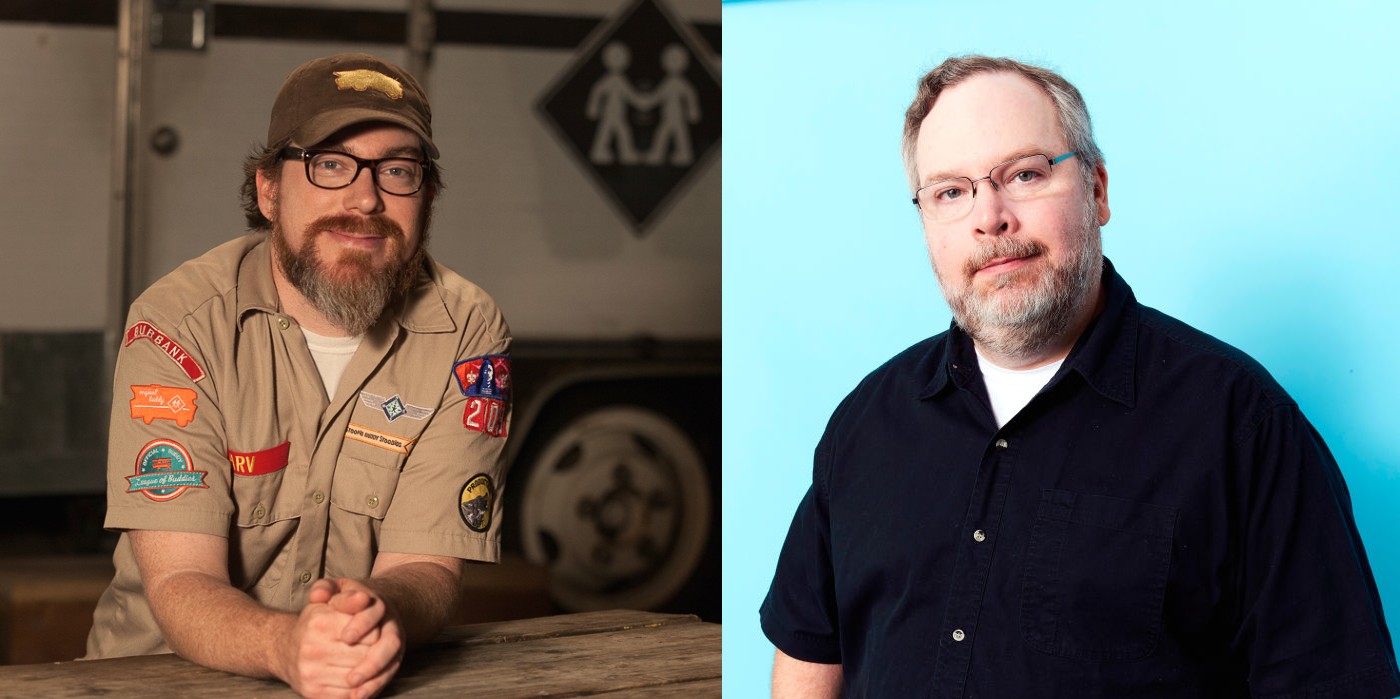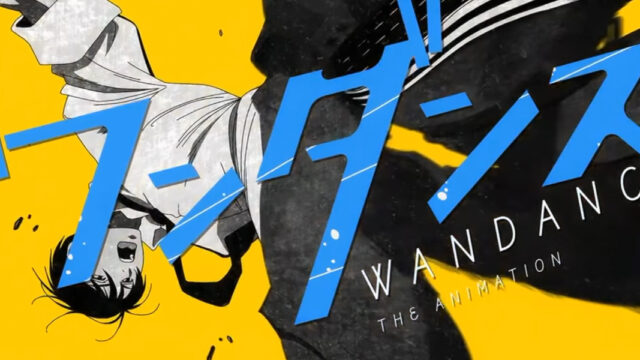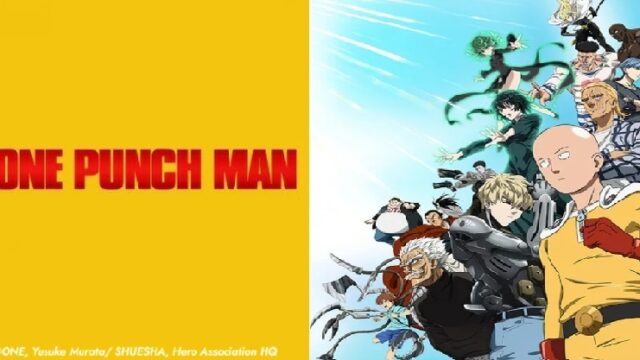Crossing Swords Exclusive Interview: Tom Root & John Harvatine IV

Tom Root and John Harvatine IV made a name for themselves with Robot Chicken, the stop-motion sketch series that, over the course of its nearly 15 year run-time, has developed into one of the most powerful forces of pop culture parody America has ever seen. For their latest show, Crossing Swords—which will be arriving on Hulu come June 12—the duo has ditched their action figurines in favor of wooden pegs. With these simplistic toys, not unlike the ones many of us owned in our childhood, they bring to life a fantasy world as cruel and complex as that of HBO’s Game of Thrones, and yet find a way to make it even more R-rated.
Tim Brinkhof: Where did the idea for Crossing Swords come from?
Tom Root: Almost everything evolved from the shape of the puppets we were using. We’ve been working in stop-motion animation for a long time, and rarely do we get to use puppets that are as simple as these peg people. They made us nostalgic about the toys we had as kids, how simple they were back then, and how, at that age, you used your imagination to fill in the gaps. So we decided we wanted to make a peg person show first and foremost, and only then did we start to figure out what it was gonna be like.
TB: Can you talk a bit more about how the absence of limbs on your characters affected the stories you ended up telling through them?
TR: Like I said, we wanted our audiences to fill in the gaps. That said, we still had to find a way to use these simple puppets to communicate complex thoughts and gestures, which is difficult to do when you don’t have arms and legs. Since the characters cannot hold onto anything, their accessories just kind of float next to them, which is something I think people are used to seeing now anyway. It wouldn’t be out of the ordinary, for instance, to find characters like that in video games. When a character in our show has a sword, then, that sword doubles as his arm. Of course, a lot of this stuff wouldn’t be possible if it weren’t for our animators, who are so good at bringing to live inanimate objects, and giving personality to something that’s not alive just by changing the way it leans or turns and other small motions that make it look like it’s human, even though it’s just a chunk of wood.
TB: Because of all these limitations you’re describing, was there ever a moment where you came up with something in the writers’ room that you couldn’t quite figure out how to do on set?
TR: Nothing big, just small things. In the pilot, there’s this shot of a group of people are supposed to be clapping and stamping, but technically they can’t do either of those things because they don’t have hands or feet. So, how do you get away with that? The answer was sound, which we used off-screen. These challenges also provide opportunities for gags.
John Harvatine IV: Right. For example, if we want to have a character pick his nose, he’ll have to us his sword in order to do so, because he doesn’t have hands, let alone fingers. So, props can be very helpful to us.
TB: I recently interviewed the guys who made The Most Popular Girls in School, which is a stop-motion parody made with Barbie dolls, and they said they also treated the lack of movement as an asset rather than a disadvantage to their storytelling. Anyway, you worked on Robot Chicken for a quite a while before making Crossing Swords. How did one prepare you for the other?
JH: The animation industry moves so fast. We typically have twelve to thirteen months to pull a show together. I don’t know the math, but it’s hours and hours of content. It’s managing the writers’ room together with production, storyboards, animation and camera all at the same time. Pulling all these different departments together to work in unison, and under such tight deadlines—I think Robot Chicken really showed us how to do that efficiently.
TB: In Robot Chicken, you parody so many different stories, but Crossing Swords is firmly based in a single genre: fantasy. What was your experience like going from a show where you could pretty much do anything, to this new story which had some unwritten rules attached?
TR: We don’t necessarily think of Crossing Swords as a show where our marching order is telling a fantasy story; we think of it like we’re telling a story about these particular people and what we find funny about them are their characteristics rather than the genre in which they reside. As an example, the pilot features an orc who sells glow-in-the-dark, velvet paintings, and we don’t really make a joke about him being an orc. It’s a funny visual, that there’s an orc wearing a big mustache per disguise—which isn’t a good disguise, at least not for an orc—but what we find funny about him is his sales pitch to Patrick, our protagonist, trying to get him to buy a painting. He’s giving away his entire backstory about how he thought he was a good artist but then moved to the big city and found out he really wasn’t that great and now he’s struggling to sell paintings to pay his rent, and it’s all falling apart, and Patrick is just like, “I don’t want to buy a painting; I want to get out of this conversation.” And none of this has anything to do with fantasy; it’s a tragic-to-the-point-of-being-funny conversation that you could set in any time period—and that’s what we do throughout the show: telling the story from a human perspective rather than a genre one.
TB: You’ve partially answered my next question already, but I’d still like to ask it. There have been a lot of adult-oriented, genre-bending, animated fantasy shows in the past few years—Disenchanted, Harmonquest, Midnight Gospel to some extent—and a lot of them have introduced certain tropes like cowardly nights, tomboyish princesses and sexually-depraved rulers, some of which I saw pop up in the trailer of Crossing Swords. Were you aware of these tropes, and did you ever try to circumvent or reimagine them during development?
TR: I do not think we’re consciously trying to reinvent anything. As a writer, I think your first instinct is always to take a trope and flip it. The best-known version of a princess is the damsel in distress, who gets rescued by the knight and is helpless on her own. Therefore, every contemporary writer’s gut tells them to write a princess who can take care of herself. You see this in Tangled or Disenchanted or anywhere else. It has almost become the starting point. As for the debaucherous king—the last thing people are gonna buy, especially in this country with the leadership it’s seen in recent years—nobody’s gonna buy a just king who always acts righteously. So, you start with a flawed leader, and you ask yourself which of his flaws might be funny, or interesting.
TB: What were some of the shows that inspired Crossing Swords?
JH: When I started in animation, I was working on a stop-motion animated kids’ show, and I really didn’t enjoy doing kids’ animation. I loved stop-motion, and I loved toys, but when I was animating these toys for kids, I found it really unsatisfying. I was fantasizing about doing adult things—fighting, swearing, having sex—and developed a soft spot for toy animation doing adult things. Robot Chicken is such a great toy animated show, and the things we could get away with it, we just thought it would be so much fun to make a similar style show in a different setting, one where we could further develop our characters.
TR: For me, I wanted to expend our map, to find more places to see, more things to do, more people to meet. And, in that respect, it was The Simpsons which showed me how something like that could be done. When I was watching anime in my twenties, there was a show called Slayers, which was about a lot of stuff, but the basic formula was just this group of adventurers on a quest, and even though they would run into something new each episode, there was still an overarching story, and every season felt really complete.
TB: A lot of animated shows nowadays tend to blend episodic with linear storytelling. Can we expect something similar from Crossing Swords?
TR: We don’t want it to feel linear until the end of a season, and then we want you to realize we’ve been doing linear storytelling the whole way through. Before we get there, however, we want you to feel as though it’s episodic. When you start at the beginning of anything, the idea that it is chapter one of one thousand is simply exhausting. We don’t want to give viewers the impression they have to invest all this time up front.
TB: As far as the first season of the show is concerned, how much character development will we be seeing?
TR: I think we want you to feel like our main character is growing and changing, which is important to us. At a certain level, some characters are just never gonna change in any real and meaningful way. But as long as Patrick is evolving, and his relationships with people who are important to him change, that’s what will be driving the show. That said, no characters will be undergoing any religions conversions—although that might be fun.
TB: What about the setting, the world in which the story takes place, will that undergo any significant geographical, social or cultural development as the story continues?
TR: I think it’s possible, depending on what the plot requires. We designed the show in such a way that if we want season eight to take place completely in space, there are ways we can get there. If we want to do time travel, we can do that too. Anything’s possible. We have been concentrated in the politics of this kingdom, what the citizens want out of their leaders—that’s something we are conscious of, and we think the political climate of our kingdom, and the kingdoms surrounding that kingdom, might just become more important as the show progresses
JH: It’s funny how anything can happen in this show, yet we found a way to ground it in such a way that things aren’t all bananas; everything has a reason, an internal logic, there’s rules that are slowly revealed.
Crossing Swords premieres June 12th only on Hulu. This interview was edited and condensed for clarity.













"There are also other characters that come and go (also owned by the Warner Bros. Discovery conglomerate media company)."
Huh. Is that just referring to other characters from the show itself, or is this implying that the new season is going to have cameos from other WBD IPs